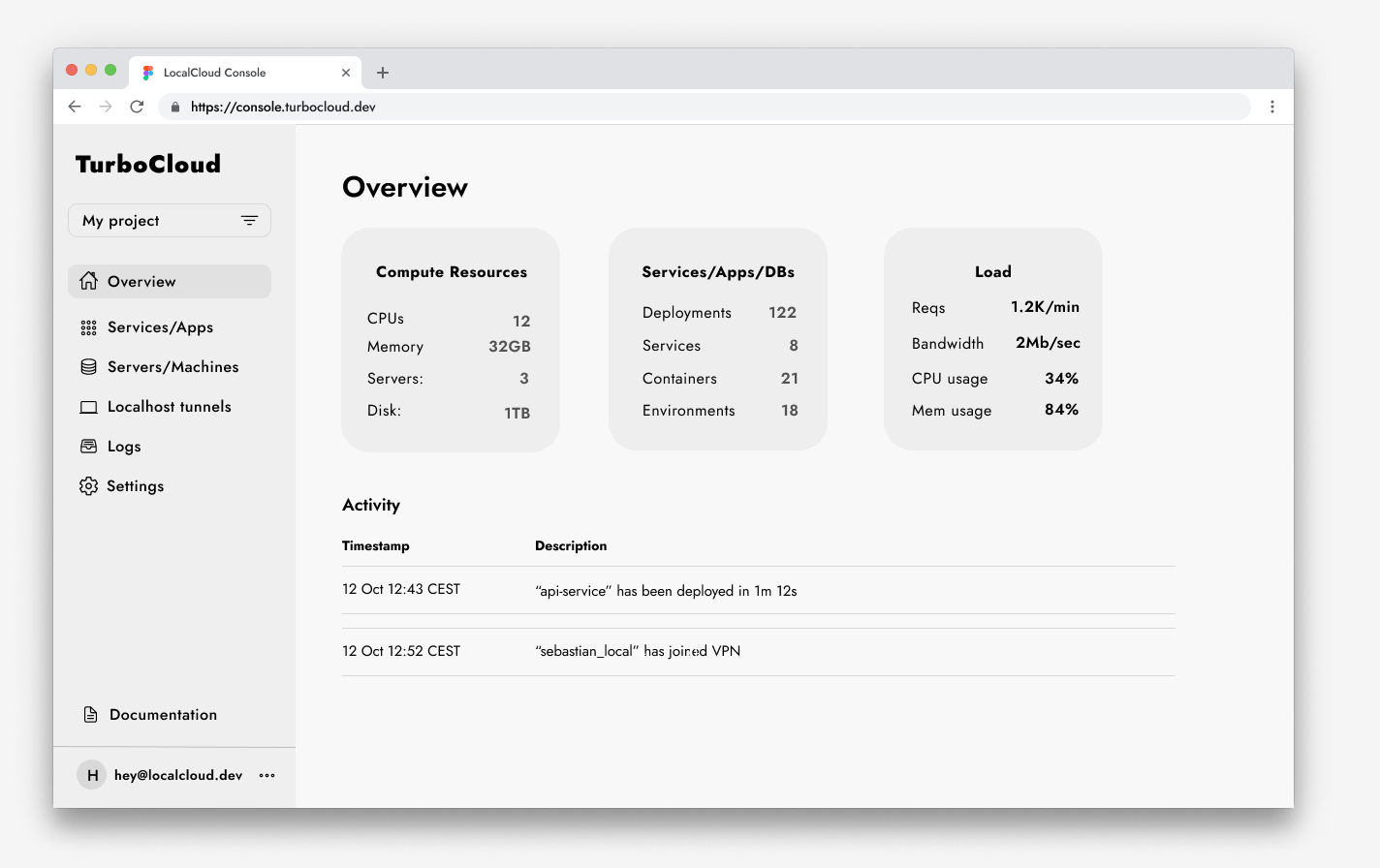TurboCloud is a security-first alternative to Heroku, Render, Platform.sh and other proprietary PaaS / Serverless with no vendor lock-in. Deploy any projects almost anywhere - on virtually any cloud provider/Raspberry Pi/old laptops in minutes.
More info about the project: turbocloud.dev
Contact us if you have any questions: hey[a]turbocloud.dev
Don't forget to click on Star if you like the project.
- Single binary
- No Ops & no infrastructure management
- Deploy directly from a local repository or from GitHub, Bitbucket, and GitLab
- Deployments with or without a Dockerfile
- Includes a built-in container registry (no need for a third-party container registry)
- WAF (Web Application Firewall) with a set of generic attack detection rules recommended by OWASP
- No configuration in YAML files is required
- Rate limiting (WIP)
- VPN (Virtual Private Network) or VPC (Virtual Private Cloud) between different data centers, local machines, and on-premise servers
- Deploy static websites, Node.js, Golang, and virtually any runtime environment
- Load balancer and proxy server
- Autoscaler (WIP)
- CI/CD (Continuous Integration & Continuous Deployment)
- Localhost tunnels: expose local web servers via a public URL with automatic HTTPS and custom domains (WIP)
- HTTPS-enabled and WSS-enabled custom domains
- Works with virtually any VPS, cloud, dedicated server, or Single Board Computer running Ubuntu 22.04 LTS, so you can choose any cloud provider
- Unlimited environments for each project
- Custom domains for each environment
- GitOps or push-to-deploy
- SSH access to servers
- Resource usage monitoring
- Requires only around 50 MB of RAM and approximately 4.0% CPU usage on servers with 1vCPU
- A server (for example, a server on Hetzner, DigitalOcean, Scaleway, etc.) with a public IP (at least one public IP per project), SSH access, and Ubuntu 22.04
- Dockerfile in the root folder of your project (haven't Dockerfile yet - just search or ask AI "create dockerfile for Node.js" or "create dockerfile for go"), etc.
- (Optional) Domain name
In the root folder of your project on your local machine, run the following command (replace server_public_ip with the IP of your server and port_your_app_listens_to with a port you use in your service/app):
curl https://turbocloud.dev/deploy | bash -s -- -i server_public_ip -p port_your_app_listens_to
To use a custom domain, add the -d parameter (make sure your domain’s A record points to your server’s IP address):
curl https://turbocloud.dev/deploy | bash -s -- -i server_public_ip -p port_your_app_listens_to -d some_domain.com
Once installation is complete, open console.turbocloud.dev in a browser to add and manage servers/apps/databases/localhost tunnels.
SSH into your server running a clean Ubuntu 22.04 installation, and run the following command:
curl https://turbocloud.dev/setup | bash -s
Once the installation is complete, open console.turbocloud.dev in your browser to add and manage servers, apps, databases, and localhost tunnels.
If you prefer to install remotely, run the following command on your development machine (replace <code>server_public_ip</code> with your server's actual IP address; SSH access is still required):
curl https://turbocloud.dev/quick-start | bash -s -- -i server_public_ip
Once the installation is complete, open console.turbocloud.dev in your browser to add and manage servers, apps, databases, and localhost tunnels.
To quickly update the agent on a server, you can use the update-agent-from-local.sh script (tested on Linux and macOS). This script builds a new agent locally, uploads it to the server, and restarts the agent service:
./scripts/update-agent-from-local.sh -i server_ip_with_agentGNU GENERAL PUBLIC LICENSE
Contact us at hey@turbocloud.dev if you have any questions.
